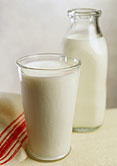- Double Mastectomy May Offer No Survival Benefit to Women With Breast Cancer
- Toxic Lead Found in Cinnamon Product, FDA Says
- Certain Abbott Blood Sugar Monitors May Give Incorrect Readings
- Athletes Can Expect High Ozone, Pollen Counts for Paris Olympics
- Fake Oxycontin Pills Widespread and Potentially Deadly: Report
- Shingles Vaccine Could Lower Dementia Risk
- Your Odds for Accidental Gun Death Rise Greatly in Certain States
- Kids From Poorer Families Less Likely to Survive Cancer
- Tough Workouts Won’t Trigger Cardiac Arrest in Folks With Long QT Syndrome
- At-Home Colon Cancer Test Can Save Lives
Milk, Egg Allergies Seem to Make Parents Most Anxious


Parents and other caregivers of children who are allergic to milk and eggs have higher anxiety and stress levels than those whose children are allergic to peanuts, researchers report.
That finding even surprised the authors of the study published in the July issue of the journal Annals of Allergy, Asthma and Immunology.
“It’s assumed peanut and tree allergies are the most severe, and therefore it may be presumed they would cause the most strain for caregivers,” lead author and allergist Dr. Laura Howe said in a journal news release.
“But because eggs and milk are everywhere, and used to prepare so many dishes, caregivers with children allergic to those two ingredients feel more worried and anxious,” she explained.
Howe and colleagues surveyed 305 caregivers of children allergic to milk, eggs, peanuts or tree nuts — the four most common food allergies — and found that knowledge was important for peace of mind. Caregivers who knew exactly which foods could trigger an allergic reaction in their child had lower anxiety and stress levels.
The researchers also found that 64 percent of caregivers clearly understood the severity of their child’s allergic reaction. Another 19 percent thought the reaction was less severe than it actually was. And, more than 15 percent thought the reaction was more severe than it really was.
Many caregivers said they were greatly concerned about their ability to help their child in the event of an allergic reaction. Many also said that other people wouldn’t understand the serious threat posed by their child’s food allergy.
“It is important for those who care for food-allergic children to work with an allergist to determine exactly what foods their child is allergic to, and how to respond in an emergency situation,” Dr. Michael Foggs, president of the American College of Allergy, Asthma and Immunology, said in the news release.
“Parents need to have a clear plan of action in case their child eats a food they shouldn’t. Children with a history of severe allergic reactions, and their caregivers, need to know how to administer epinephrine. Having plans in place can ease a parent’s worries,” he said.
More information
The U.S. National Library of Medicine has more about food allergy.
Source: HealthDay
Copyright © 2024 HealthDay. All rights reserved.










